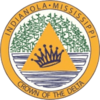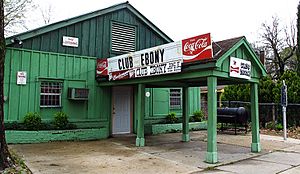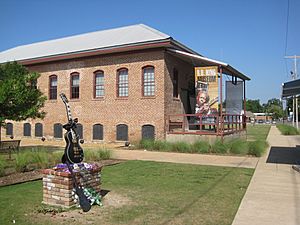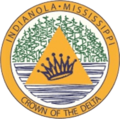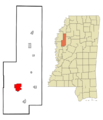Indianola, Mississippi facts for kids
Quick facts for kids
Indianola, Mississippi
|
|||
|---|---|---|---|
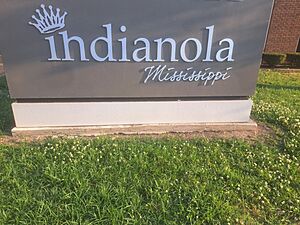 |
|||
|
|||
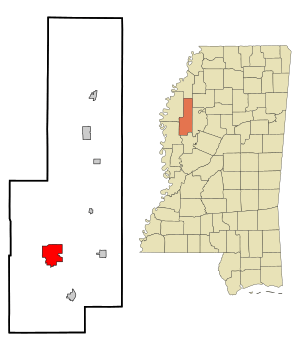
Location of Indianola, Mississippi
|
|||
| Country | United States | ||
| State | Mississippi | ||
| County | Sunflower | ||
| Area | |||
| • Total | 8.66 sq mi (22.42 km2) | ||
| • Land | 8.57 sq mi (22.20 km2) | ||
| • Water | 0.09 sq mi (0.23 km2) | ||
| Elevation | 121 ft (37 m) | ||
| Population
(2020)
|
|||
| • Total | 9,646 | ||
| • Density | 1,125.42/sq mi (434.53/km2) | ||
| ZIP codes |
38751
|
||
| FIPS code | 28-34740 | ||
| GNIS feature ID | 2404760 | ||
Indianola is a city located in the Mississippi Delta region of the United States. It is the main city and county seat of Sunflower County, Mississippi. In 2020, about 9,646 people lived there.
Contents
History of Indianola
In 1891, an important event happened in Indianola. Minnie M. Cox was chosen to be the postmaster. This made her the first black female postmaster in the entire United States. Her job was very important and paid well.
However, some white residents were not happy about her position. In 1902, they asked her to resign. James K. Vardaman, a newspaper editor, spoke out against her. Due to these tensions, Minnie Cox decided to resign in 1903.
President Theodore Roosevelt heard about this. He believed Minnie Cox was treated unfairly. He refused to accept her resignation. To show his support, President Roosevelt closed the Indianola post office. Mail was sent to a nearby city instead. Minnie Cox continued to receive her salary. The U.S. Senate even discussed the situation. Minnie Cox left Indianola for her safety. The post office reopened in 1904.
In 1954, after the Supreme Court of the United States ruled against school segregation, a group of people in Indianola formed the White Citizens' Council. This group was created to oppose the desegregation of schools.
Geography and Climate
Indianola is located about 30 miles (48 km) west of Greenwood.
Climate in Indianola
The weather in Indianola is usually hot and humid in the summer. Winters are generally mild to cool. This type of weather is known as a humid subtropical climate.
Population and People
| Historical population | |||
|---|---|---|---|
| Census | Pop. | %± | |
| 1890 | 249 | — | |
| 1900 | 630 | 153.0% | |
| 1910 | 1,098 | 74.3% | |
| 1920 | 2,112 | 92.3% | |
| 1930 | 3,116 | 47.5% | |
| 1940 | 3,604 | 15.7% | |
| 1950 | 4,369 | 21.2% | |
| 1960 | 6,714 | 53.7% | |
| 1970 | 8,947 | 33.3% | |
| 1980 | 8,050 | −10.0% | |
| 1990 | 11,809 | 46.7% | |
| 2000 | 12,066 | 2.2% | |
| 2010 | 10,683 | −11.5% | |
| 2020 | 9,646 | −9.7% | |
| U.S. Decennial Census | |||
Population in 2020
In 2020, Indianola had 9,646 residents. There were 3,483 households and 2,209 families living in the city.
| Race | Num. | Perc. |
|---|---|---|
| White | 1,038 | 10.76% |
| Black or African American | 8,236 | 85.39% |
| Native American | 5 | 0.05% |
| Asian | 71 | 0.74% |
| Other/Mixed | 155 | 1.61% |
| Hispanic or Latino | 141 | 1.46% |
Population in 1990
In 1990, Indianola had 11,809 people. Most of the residents were Black or African American (65.69%). About 33.39% were White. A small number of residents were Native American, Asian American, or from other backgrounds. About 0.55% of the population was Hispanic or Latino.
Economy and Jobs
Indianola is an important town in the Mississippi Delta because of its location. It sits where U.S. Route 49W and U.S. Route 82 meet. This crossroads helps the local economy.
In the 1980s and 1990s, a large store built a distribution center near these highways. This brought new money and jobs to the area. Many people found jobs that did not require special training.
However, in 2011, a catfish processing company called Delta Pride closed its plant in Indianola.
Culture and Arts
Indianola has a relaxed pace of life. It is known for the beautiful Indian Bayou, a small river that flows through the downtown area.
Blues Music
Indianola is famous for its connection to blues music.
- The blues musician Albert King was born here.
- Little Arthur Duncan, a blues harmonica player, was also born in Indianola in 1934.
The legendary B.B. King grew up in Indianola. He often returned to the city for the blues festival named after him. His 1970 album, Indianola Mississippi Seeds, is named after the city. The B.B. King Museum and Delta Interpretive Center opened in 2008. This museum is dedicated to B.B. King and the history of blues music.
Education in Indianola
The Sunflower County Consolidated School District manages the public schools in Indianola. Students attend Lockard Elementary School (Kindergarten-2nd grade), Carver Elementary School (3rd-6th grade), Robert L. Merritt Junior High School (7th-9th grade), and Gentry High School (10th-12th grade). The district also has the Indianola Career and Technical Center and the Indianola Academic Achievement Academy.
Indianola Academy is a private school in the city. Many white teenagers in Indianola attend this private school instead of the public high schools. The Sunflower County Library operates the Henry M. Seymour Library in Indianola. This library is also the main office for the county library system.
Notable People
Many talented people have come from Indianola:
- Little Arthur Duncan, a harmonica player and singer.
- Vera Chandler Foster, a social worker.
- Albert King, a famous blues guitarist and singer.
- B.B. King, a legendary American blues singer, songwriter, and guitarist.
- George Jackson, a songwriter and singer.
- Edward A. Jones, an African-American author.
- Micheal Spurlock, an American football player.
- Mary Alice, an American actress for TV, film, and stage.
- Mr. Bo, an American electric blues guitarist and singer.
Transportation
The Indianola Municipal Airport is located near Indianola. The city operates this airport.
Media
The local newspaper, The Enterprise-Tocsin, has its offices in Indianola.
Indianola in the Media
- Students at Gentry High School in Indianola set a Guinness World Records record in 2003. They created the world's largest comic strip in their school parking lot. The comic strip was called Lucky Cow. It was so big it could cover 35 school buses! It measured 135 feet wide and 47.8 feet high.
- The book Two years in the Mississippi Delta tells the story of Michael Copperman's time with the Teach for America program in Indianola. In the book, Indianola is called "Promise."
Images for kids
See also
 In Spanish: Indianola (Misisipi) para niños
In Spanish: Indianola (Misisipi) para niños
 | John T. Biggers |
 | Thomas Blackshear |
 | Mark Bradford |
 | Beverly Buchanan |



